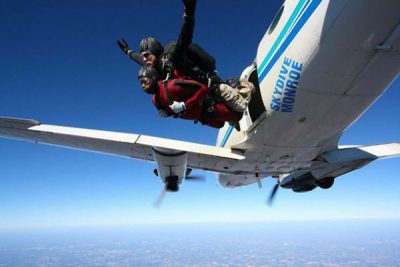The psychological effects of skydiving are more significant than their physical counterparts. People have a natural aspiration to find their limits and push beyond them; if we didn’t, there would never be any growth. Skydiving is a challenge to be conquered and is inherently a bit risky. Let’s take a look into the psychology behind the desire to skydive and the most prominent mental after-effects of skydiving.
What Is The Psychology Behind Skydiving?
People have wanted to fly for as long as we can remember! Seriously, there’s been drawings of parachutes that date back to the 1100s and ancient Greek mythology recalls the powerful story of Icarus, who created wings to fly away. Skydiving enables people to live out their childhood dreams and experience the freedom of human flight. We aren’t psychologists by any means, but we are pretty savvy when it comes to the benefits of skydiving.
 Many avid skydivers say that skydiving is cheaper than therapy. We’re biased, but does skydiving actually help anxiety? Yes! Think of it this way: skydiving is an experience that has to be taken sooooo seriously that you genuinely cannot afford to have your mind wander elsewhere.
Many avid skydivers say that skydiving is cheaper than therapy. We’re biased, but does skydiving actually help anxiety? Yes! Think of it this way: skydiving is an experience that has to be taken sooooo seriously that you genuinely cannot afford to have your mind wander elsewhere.
Being physically above our problems on the ground and seeing how minuscule they allow us to settle our conscience and excel at the task at hand: the skydive! There are very few things in life that require your undivided attention, and while it seems stressful that skydiving is one of them, it is actually extremely relaxing and rejuvenating.
Why do people come back to keep jumping? The bottom line, humans’ natural desire for growth combined with the happiness that skydiving brings is unbeatable!
Why Do We Like To Take Risks?
Okay, let’s briefly address the risks of skydiving. Of course, jumping from an airplane has inherent risks … but so does standing on the sidewalk and driving a car. We vehemently put safety at the front of our minds during every skydive. (FYI, statistically speaking, out of the nearly 4 million tandem and solo skydives made in 2022, 20 were fatal. Isolating the tandem stats, the 10-year average is one student fatality per 500,000 jumps.)
People take risks because they simply enjoy the effects that come afterward – the hype, stimulating euphoria, and being proud of overcoming something! Note: skydivers have a humble type of confidence and pride, no cockiness here!
What Are The Mental Effects Of Skydiving?
 Adrenaline, serotonin, dopamine, and endorphins flux through our bodies when we do something that’s simultaneously enjoyable and exhilarating – AKA when we go skydiving! These chemicals make us feel all giddy with happiness and have lasting benefits far past the actual skydive.
Adrenaline, serotonin, dopamine, and endorphins flux through our bodies when we do something that’s simultaneously enjoyable and exhilarating – AKA when we go skydiving! These chemicals make us feel all giddy with happiness and have lasting benefits far past the actual skydive.
- Adrenaline: When adrenaline courses through our brains, the effects are immediate and strong. Adrenaline is the chemical that gives people superhuman strength to lift cars in emergency situations! It essentially spikes our heart rate, our lungs breathe faster and more efficiently, and it makes us hyper-focused on what we’re doing. Having adrenaline while skydiving allows us to think clearly and make decisions in emergency situations.
- Serotonin: The feel-good chemical, serotonin, allows us to feel happy. Serotonin has awesome side effects on our sleep, mood, and even our digestion. It simply leaves us feeling awesome! We think that serotonin is released in our brains during a skydive because we’re actually DOING IT! Skydiving is something the majority of people on this fine planet will never do, and conquering that feat is huge for our mental health.
- Dopamine: Another happy chemical is dopamine. Dopamine acts as a neurotransmitter (sends messages from our brains throughout our bodies) and as a hormone. When we do something that deserves a reward, something we succeed at, we feel accomplished, and this is due to an influx of dopamine. Dopamine allows us to feel focused and motivated, which is critical to having a successful skydive.
- Endorphins: Endorphins can make us feel filled with elation! They’re also a neurotransmitter and relieve pain and stress. While your skydiving experience isn’t made to be painful by any means, it can be stress-inducing. Endorphins save the day by chilling you out. The release of endorphins happens most commonly when doing physical activity, this is why people say they need to go on a run to clear their head and come back feeling centered. If a run right-sizes your problems, imagine what jumping from a plane does …
What Does Skydiving Personality Mean?
If you hang around the dropzone long enough you’ll start to notice a binding similarity between jumpers, despite their many differences. Having a “skydiving personality” simply means being a team player, possessing an infectious aura of humility, having the constant desire to get better, and feeling the inclination to help others grow in the sport. Jumping from planes is all fine and dandy, but it’s not the physical act that defines what skydiving says about you.
Are you ready to overcome your fears and discover the magical psychology of skydiving for yourself? Join our tribe and book your first jump today!
Copyright © 2025, Skydive Monroe, All Rights Reserved.
DropZone Web Design & Marketing by Beyond Marketing, LLC



